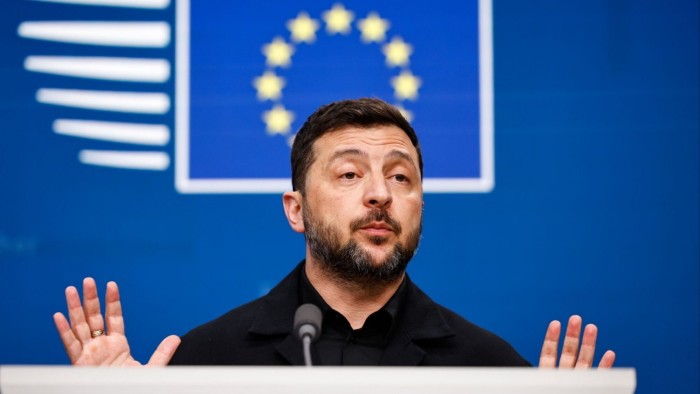Stay informed with free updates
Simply sign up to the War in Ukraine myFT Digest — delivered directly to your inbox.
EU leaders have failed to back a €140bn loan to Kyiv using frozen Russian state assets following opposition from Belgium, dashing Ukraine’s hopes of accessing funds early next year to stave off Russia’s aggression.
The EU leaders meeting on Thursday in Brussels discussed using cash arising from around €190bn in frozen sovereign Russian assets to fund a “reparations loan” for Kyiv, as efforts to end Russia’s war against Ukraine falter and the US pulls back support.
However, Belgium dug in on its opposition to the scheme, fearing legal and financial repercussions should Russia retaliate against the plan given that the assets are held at the Brussels-based Euroclear central securities depository, according to officials.
Leaders of 26 EU countries — Hungary abstained — asked the European Commission to “present, as soon as possible, options for financial support based on an assessment of Ukraine’s financing needs” but did not formally back a loan based on Russia’s immobilised assets.
They agreed to “revert to this issue at [their] next meeting” in December.
“The EU is committed to addressing Ukraine’s pressing financial needs for the next two years, including support for its military and defence efforts. Russia must stop the war immediately,” European Council president António Costa wrote on social media platform X.
Belgian Prime Minister Bart De Wever had arrived at the meeting demanding that the bloc share the financial and legal risks.
He said if his request was not endorsed, he would “do everything in my power, at the European level, also at the national level, politically and legally to stop this decision”.
“I want a full mutualisation of the risk,” De Wever said. “We want guarantees if the money has to be paid back, that every member state will chip in. The consequences cannot only be for Belgium.”
EU leaders tried to assuage the Belgian premier’s fears, with a first draft of conclusions pledging to show “solidarity and risk-sharing” and address “the specificities and legitimate concerns of affected member states”. But it was not enough to ease his concerns.
The failure to back the scheme is likely to delay the commission’s goal of having the “reparations loan” approved by the end of the year, and could complicate funding plans for Kyiv’s weapons purchases.
The Trump administration has pressured Europe to pay for arming Ukraine, including for US-made weapons.
It comes ahead of a meeting of the leaders of the so-called “coalition of the willing” countries on Friday, which had hoped to send a strong signal of support to Ukraine amid faltering peace talks.
Ukrainian President Volodymyr Zelenskyy, who attended the EU summit, had pointed out that Kyiv would need the money next year as it faces significant funding requirements in its war against Russia.
“We need the money in 2026 and better to have it in the very beginning of the year but I don’t know if it’s possible,” Zelenskyy said.

